

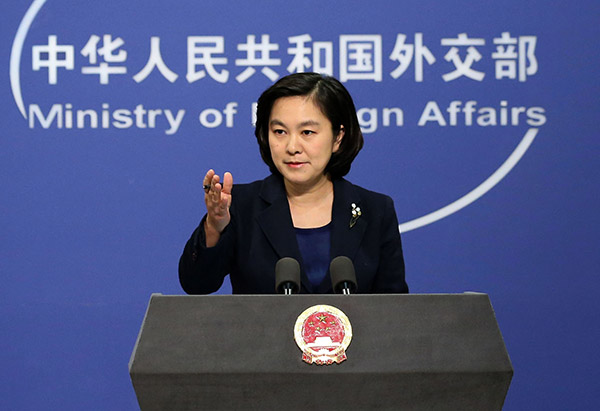 |
| Foreign Ministry spokeswoman Hua Chunying briefs media on the DPRK nuclear test issue during a daily press briefing in Beijing, Jan 6, 2016. (Photo/China Daily) |
China on Thursday expressed concern over the current developments on the Korean Peninsula, urging all members of the Six-Party Talks to return to the negotiation table after South Korea and the US discussed deploying strategic weapons in response to North Korea's nuclear test.
Analysts believe the deployment on the Korean Peninsula will further aggravate tensions in Northeast Asia and risk upsetting China and Russia.
Peace and stability on the Korean Peninsula and in Northeast Asia meet the common interests of all concerned, foreign ministry spokeswoman Hua Chunying said Thursday at a regular press briefing.
China is determined to advance denuclearization on the Korean Peninsula and settle the nuclear issue through the Six-Party Talks, she said.
The talks stalled in 2008, with the North quitting the process in 2009.
South Korea's Joint Chiefs of Staff Chairman Lee Sun-jin and US Forces Korea commander Curtis Scaparrotti on Wednesday discussed the deployment of US strategic assets on the Korean Peninsula, including a nuclear-powered submarine, the F-22 stealth combat fighter and the B-52 bomber, a South Korean military official said Thursday.
South Korea also said it would resume propaganda broadcasts by loudspeaker into North Korea from Friday, which is likely to infuriate Pyongyang, Reuters reported.
"The military deployment is possible as the US will not dismiss the chance to expand its military presence in the Asia-Pacific region, neither will its ally Japan," Lü Chao, a researcher at the Liaoning Academy of Social Sciences, told the Global Times.
Moreover, the US is overreacting as military deployment would only aggravate tensions in the region and the situation may spiral out of control, especially if there are any incidents, he said.
US President Barack Obama spoke to his South Korean counterpart Park Geun-hye Thursday. The two agreed to forge a united and strong international response and that North Korea should pay the corresponding price, the Yonhap News Agency reported.
Obama also said the US would take measures to ensure the security of its allies, including Japan, during a phone conversation with Japanese Prime Minister Shinzo Abe Thursday morning, the Xinhua News Agency reported.
After North Korea last tested a nuclear device in 2013, Washington sent a pair of nuclear-capable B-2 stealth bombers on a sortie over South Korea in a show of force. At the time, North Korea responded by threatening a nuclear strike on the US.
North Korea's official media announced it had successfully conducted its first hydrogen bomb test at 10 am on Wednesday, its fourth nuclear test.
No pollution
Separately, US Republican presidential candidate Donald Trump said on Wednesday that China should take the lead in tackling North Korea, Reuters reported Thursday.
"China has total control," Trump said on Fox News. "They have total control over North Korea, and China should solve that problem. And if they don't solve the problem, we should make trade very difficult for China."
"Trump is being ignorant and ridiculous. China was not informed in advance and has also been a victim of the test as a neighbor of North Korea," said Lü.
The test site, in the northeast of the country at the Punggye-ri nuclear site, is only 100 kilometers from the Chinese border.
According to sample tests on water, air and soil in Northeast China's border cities, together with weather forecasts for the coming week, North Korea's nuclear test will not cause any pollution in China, the Ministry of Environmental Protectionannounced on its website Thursday.
The US should take the major responsibility, said Lü, as according to the North Korean statement, the test was mainly targeting the US. It was also a result of the failed US policy to hold a contradictory approach to address the nuclear issue of North Korea.
The US, European Council members and Japan would seek to expand existing UN sanctions against Pyongyang if the latest North Korean nuclear test was confirmed, several Western diplomats said, Reuters reported.
Related:
Chinese FM Holds Phone Talks with U.S. Secretary of State Over North Korea Nuclear Problem
Chinese Foreign Minister Wang Yi held telephone talks at request with U.S. Secretary of State John Kerry, exchanging opinions on Korean Peninsula nuclear problem on January 7, 2016.
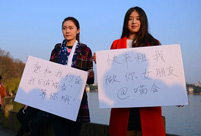 "Rent me as your girlfriend!"
"Rent me as your girlfriend!" World's first 'underwater skyscraper'
World's first 'underwater skyscraper' 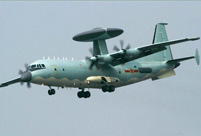 Top 10 weapons in the world in 2015
Top 10 weapons in the world in 2015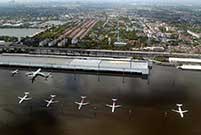 Are these the world’s scariest landing strips?
Are these the world’s scariest landing strips?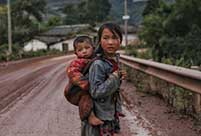 In pics: Left behind children in China
In pics: Left behind children in China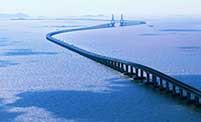 Eight modern day engineering marvels of China
Eight modern day engineering marvels of China Chinese beauty with sexiest bottom
Chinese beauty with sexiest bottom Charming female bodybuilders of Chengdu University
Charming female bodybuilders of Chengdu University Polish sports stars strip off for risqué calendar
Polish sports stars strip off for risqué calendar Top 20 hottest women in the world in 2014
Top 20 hottest women in the world in 2014 Top 10 hardest languages to learn
Top 10 hardest languages to learn 10 Chinese female stars with most beautiful faces
10 Chinese female stars with most beautiful faces China’s Top 10 Unique Bridges, Highways and Roads
China’s Top 10 Unique Bridges, Highways and Roads House of fakes
House of fakes Internet + cars = a long, bumpy road
Internet + cars = a long, bumpy road Nuclear test won't change NK’s destiny
Nuclear test won't change NK’s destiny China’s circuit breaker mechanism sparks global market fluctuations
China’s circuit breaker mechanism sparks global market fluctuationsDay|Week